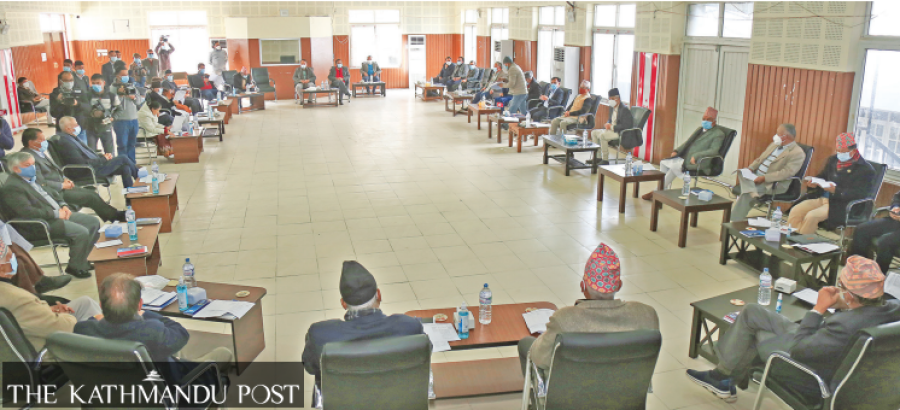Politics
It’s either 40 percent ticket share or poll boycott, rival camp threatens Deuba
Leaders supporting Koirala-Thapa faction voice their fears of the Congress not fielding candidates from the camp.
Anil Giri
As the ruling alliance struggles to divide electoral seats among five parties, the Nepali Congress is in a tricky position with its factional dispute running deep over how many of the 165 federal parliament candidacies the party should keep with itself.
On Saturday, the faction led by Shekhar Koirala held a separate gathering at a hotel in Thamel and decided to demand at least 40 percent seats in the November 20 federal and provincial elections. The camp, also involving a Congress general secretary, Gagan Thapa, is opposed to the policy of party President Sher Bahadur Deuba, who is for keeping the alliance intact by demonstrating maximum flexibility while sharing the seats with other partners.
The Koirala faction, which was initially opposed to fighting the election in alliance with other parties, now argues that the Congress should go to the polls with no less than 100 House candidates. The Deuba faction is more flexible on the number.
Thapa was absent from the meeting after he was diagnosed with dengue. But senior leaders Koirala, Vice President Dhan Raj Gurung, and joint secretaries Jeevan Pariyar and Badri Pandey were among those present, party members said.
In the meeting, leaders supporting the Koirala-Thapa faction spoke of their fears of the Congress not fielding candidates from the faction. A participant told the Post that they would revolt if the party establishment failed to accommodate enough candidates from their camp.
Seat-sharing for the first-past-the-post (FPTP) system of the elections is under consideration at the top level of the ruling alliance. The Congress has handed over the responsibility of deciding the names to be submitted under the proportional representation to its eight joint secretary generals.
The party should issue tickets to the candidates who have the potential to win and there should be no discrimination on the basis of support for a particular leader, said Chandra Bhandari of the camp. There is a sense of apprehension in the rival faction that its members are being increasingly isolated.
Koirala, who became a factional leader after his defeat by Deuba as president in the party’s 14th general convention held in December last year, has been upping the ante since the local elections in May.
The Koirala-Thapa camp insists on honouring the 40 percent vote received by Koirala in the general convention. But Deuba kept on ignoring their call. After repeated threats from the Koirala-Thapa camp, Deuba communicated to them that he would address their concern.
“If we don’t get a fair share, or at least 40 percent of party candidacies in the federal and provincial elections, there will be a mutiny and we will boycott the elections,” said another leader, Gururaj Ghimire.
Out of the 165 directly elected members in the House, the Congress is seeking 100 but has internally decided to settle for 90 seats. The five ruling parties have formed a 12-member task force to settle the row over seats but it has yet to complete its job.
“We have almost settled the parties’ shares in 120 constituencies of the House but there are disputes over 45 seats,” a member of the task force told the Post.
“At present, all parties are busy selecting their FPTP candidates. Seat-sharing negotiations have been put off until Monday, when the parties submit their lists of proportional representation candidates to the Election Commission,” the member said.
The Koirala-Thapa camp also wants priority for youths in the first-past-the-post elections, suggesting that senior leaders who have made significant contributions to the party be made proportional representation candidates.
“The youths are emerging as a decisive factor. We need to respect their sentiments and field as many new faces as possible in the elections. If we distribute tickets this way, the party will win most seats,” said Bhandari.
In a party often divided along factional lines after the restoration of democracy in 1990, internal power-sharing in the Congress is usually done on a 60:40 ratio. Before Deuba was elected Congress president for the first time in 2016, the Koiralas enjoyed 60 percent share in the party. Now Deuba has the support of 80 percent of central working committee members, who make key decisions.
A leader from the Deuba camp said the demand raised by the Koirala-Thapa camp is natural and there will be some sort of a deal as neither side wants to spoil its poll prospects.
“At some point, we will find a settlement,” Ram Hari Khatiwada, a leader close to Deuba, told the Post. “If we look at the past appointments to the central working committee, the Koirala camp has received a fair share.”
Unlike in the local elections, the Koirala-Thapa camp, however, is unlikely to budge.
Ghimire said the party establishment’s attitude towards the rival camp will be visible as the party submits its list of proportional representation candidates to the Election Commission.
“Seat-sharing inside the party should be honourable and just. We want to warn the party leadership against any conspiracy that may be hatched against us,” said Ghimire.
“We must not face discrimination just because we did not vote for Deuba. If we are barred from the elections, we will boycott it.”




 13.12°C Kathmandu
13.12°C Kathmandu














